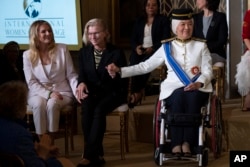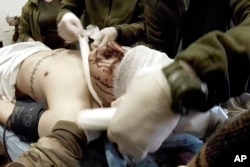On March 8, International Women’s Day, the U.S. State Department gave the 2023 International Women of Courage Award to Yuliia “Taira” Paievska, a Ukrainian medic credited with saving hundreds of lives.
But the Russian ambassador to the United States, Anatoly Antonov, called out Washington for awarding Paievska the honor, labeling her a “terrorist.”
“Paievska, with the call sign Taira, is a Ukrainian terrorist thug whose hands are stained with the blood of old people, women and children,” Antonov said.
That is false.
In announcing the decision, the State Department said:
“Yuliia ‘Taira’ Paievska has demonstrated extraordinary moral and physical courage in defending Ukraine against relentless Russian aggression. She provided medical treatment to Ukraine’s Revolution of Dignity protestors in 2013, and as head of Taira’s Angels, a volunteer unit of paramedics, she provided tactical medical training on the Donbas front lines from 2014 to 2018. Mrs. Paievska is best known for her work secretly filming and smuggling out videos documenting atrocities committed by Russia’s forces in Mariupol.
"Russia’s forces detained Mrs. Paievska on March 16 as she attempted to evacuate women and children from Mariupol to Zaporizhzhia, despite her clear non-combatant status. During a three-month imprisonment, Mrs. Paievska lived in a tiny cell with 22 other women, losing 20 pounds and enduring torture and beatings
"Moreover, the Kremlin’s propagandists falsely maligned her internationally as a fascist and war criminal. Yet Mrs. Paievska refused to be silenced, and since her release has compellingly advocated for Ukrainian democracy and independence both at home and abroad.”
Numerous independent media reports corroborate the State Department description of Paievska.
Paievska served as a volunteer street medic during the 2013 Euromaidan protests in Kyiv. After Russian forces clandestinely invaded Ukraine in 2014, Paievska went to the country’s eastern Donbas region, where she served along the conflict’s front lines. There, she taught tactical medicine and launched a volunteer ambulance corps called “Taira’s Angels,” which is credited with saving hundreds of soldiers.
Paievska said she provided care to wounded Russia-backed separatists as well as to wounded Ukrainian forces.
In 2018, Paievska joined the Armed Forces of Ukraine, serving as a military medic until 2020.
According to organizers of the Invictus Games, an international multi-sport event for wounded, injured and sick service members and veterans, Paievska headed the evacuation department of the 61st Mobile Hospital in Mariupol.
After leaving the military in 2020, Paievska and her volunteer ambulance corps continued to work in Mariupol.
In 2021, she received a body camera to film a Netflix documentary series on “inspirational figures,” The Associated Press reported.
Paievska documented Russian war crimes in Mariupol as its forces laid siege to the city following the February 2022 invasion.
According to AP, Paievska “recorded 256 gigabytes of her team’s frantic efforts over two weeks to bring people back from the brink of death,” and that footage shows “she tried to save wounded Russian soldiers as well as Ukrainian civilians,” as she had done in the Donbas.
Russian forces detained Paievska on March 16, 2022, while she was attempting to evacuate women and children following Russia’s deadly bombing of a Mariupol theater, where civilians were sheltering.
In Russian captivity, Paievska was subjected to torture and beatings.
Russia claimed Taira worked for the Azov Regiment, which was formerly the Azov Battalion, a far-right volunteer militia formed in response to Russia’s annexation of Crimea and clandestine invasion of Ukraine in 2014. The battalion was later incorporated into Ukraine’s National Guard.
Experts say the Azov Regiment is now largely depoliticized.
The Associated Press found no evidence that Taira served with the Azov Regiment, and friends and colleagues said she had no links to Azov.
In the past, Paievska was linked with Right Sector, an umbrella coalition formed by several Ukrainian far right and ultra-nationalist political groups as a radical wing of the Maidan protest. But friends of Paievska told Bloomberg she is “motivated purely by patriotism.”
In a 2017 profile of Paievska, The National News reported that she learned “recovery procedures on the front line and paramedic skills” during her time with Right Sector.
While Right Sector’s role in Ukrainian politics is marginal, Russia has long used the existence of such groups to falsely claim it is “de-Nazifying” Ukraine.
But Russia has an even “more extensive far-right problem,” including “the Kremlin’s support for Russian far-right actors in earlier stages of the conflict in Ukraine,” wrote Claudia Wallner, a research fellow and associate at the U.K.-based Royal United Services Institute think tank.








